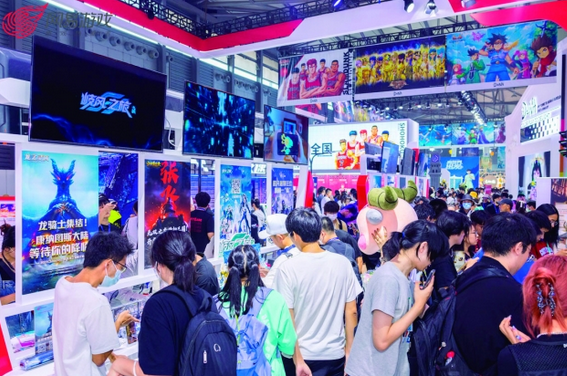AI Wave Sweeps ChinaJoy, Digital Content Ushers in a New Era for Gaming Industry
-

The 20th ChinaJoy took place from July 28 to 31 at the Shanghai New International Expo Center. This year's event was arguably the most bustling in three years.
"We tried to escort guests into the exhibition area in the morning but couldn't find a single gap to squeeze through," a brand manager from a renowned gaming company told the Shanghai Securities News. The enthusiasm of attendees far exceeded expectations, with all game merchandise prepared for distribution running out within an hour of opening.
On July 28, the 2023 China Digital Entertainment Expo & Conference (ChinaJoy) kicked off in Shanghai. As an annual highlight for the anime and gaming industry, ChinaJoy serves as a sensitive barometer for industry trends.
Revival of the Anime and Gaming Industry
This year marks the 20th anniversary of ChinaJoy. Interestingly, just a day before the event, the July batch of new game licenses was released as scheduled. Industry insiders viewed this as a "small romantic gesture" from regulators amid the normalization of license approvals.
Major domestic players like Tencent, NetEase, 37 Interactive Entertainment, and Perfect World showcased their booths, featuring nearly all mainstream games currently on the market. At popular game zones such as Honkai: Star Rail and League of Legends, queues of players circled the exhibits. Some booths even posted notices like "Merchandise exhausted, only bags left," yet fans still lined up eagerly for the remaining items.
At NetEase's booth, the crowd was drawn by the hit game Eggy Party. "We recreated many classic game scenes, including Eggy Party, attracting fans to take photos," said a booth representative. NetEase offered over 30 games for trial, including seven unreleased titles like Nine Fields: Qifeng Journey and Code 56, the latter two being publicly playable for the first time.
"We queued up early just to snag limited-edition figurines," said a player named Xiao Yin, who even scouted the venue a day prior for efficiency. The vibrant atmosphere at ChinaJoy underscored "revival" as this year's industry theme.
At the concurrent China Digital Entertainment Industry Conference (CDEC), a report revealed that China's gaming market generated ¥144.263 billion in H1 2023, down 2.39% year-on-year but up 22.2% quarterly, signaling recovery. Monthly data since May showed accelerating growth, with a strong rebound expected in H2. Meanwhile, China's gamer population hit a record 668 million.
Policy-wise, normalized regulation is trending. Sun Shoushan of the China Audio-Video and Digital Publishing Association noted significant progress in minor protection systems, with over 80% of parents approving current measures.
AI Takes the Stage
Technology has become a buzzword in gaming. A veteran game designer admitted that with stagnant innovation in traditional formats, the industry urgently needs breakthroughs to unlock new growth.
"Games are fundamentally a tech-driven form of cultural expression," said Zhang Wei of Tencent Interactive Entertainment. As a digital medium eager to adopt new tech, games are expanding beyond conventional boundaries into "super digital scenarios."
The recognition of the importance of a technological foundation has now become a consensus in the gaming industry. According to Wang Yi, Senior Vice President of NetEase, the gaming industry has the potential to foster the next "chip-level" technological breakthrough. The industry has reached a pivotal transformation phase characterized by "technology as the foundation, talent as the driver, and applications across myriad scenarios."
Starting from technology to explore the broader possibilities of the gaming industry has also become a shared vision and expectation at the regulatory level. At this year's summit forum, Yang Fang, Deputy Director of the Publishing Bureau of the Central Propaganda Department, stated that the digital content industry, a fusion of cultural content and digital technology, has long been a vital "incubator" and "testing ground" for high-tech innovation. Recently, the industry has closely followed technological trends, actively embracing cutting-edge technologies like generative AI, thereby continuously enhancing production and creative efficiency.
The emergence of ChatGPT earlier this year brought large-scale AI models into the public eye, further broadening perspectives in the gaming industry.
What exactly will AI bring to the gaming industry? Xu Zhigao, General Manager of 37 Interactive Entertainment, believes that with the rapid development of AI, it could significantly impact game design and playability in the future. "Centered on AI development, we at 37 Interactive Entertainment have formulated a 'three-step' strategy. Specifically, based on improving production efficiency at this stage, we aim to modularize and toolize AI to continuously amplify the playability of our products," Xu said. Moving forward, this will pave the way for truly "open-world" content products co-created by developers and players.
"AI's integration provides a powerful assistant for building user communities," said Guan Song, Co-founder of DreamSky. As the gaming industry enters an era of存量 (stock) competition, more efficient user operations have become crucial for any gaming company. "Through our deeply integrated AI capabilities, we can help game developers quickly enhance community operation efficiency."
However, a cautious yet optimistic approach to AI might be more appropriate. "I believe AI currently lacks the disruptive capability to replace human creativity in content production," Guan noted. A more pragmatic approach involves integrating AI as a tool into production workflows, which holds greater practical significance at present.
